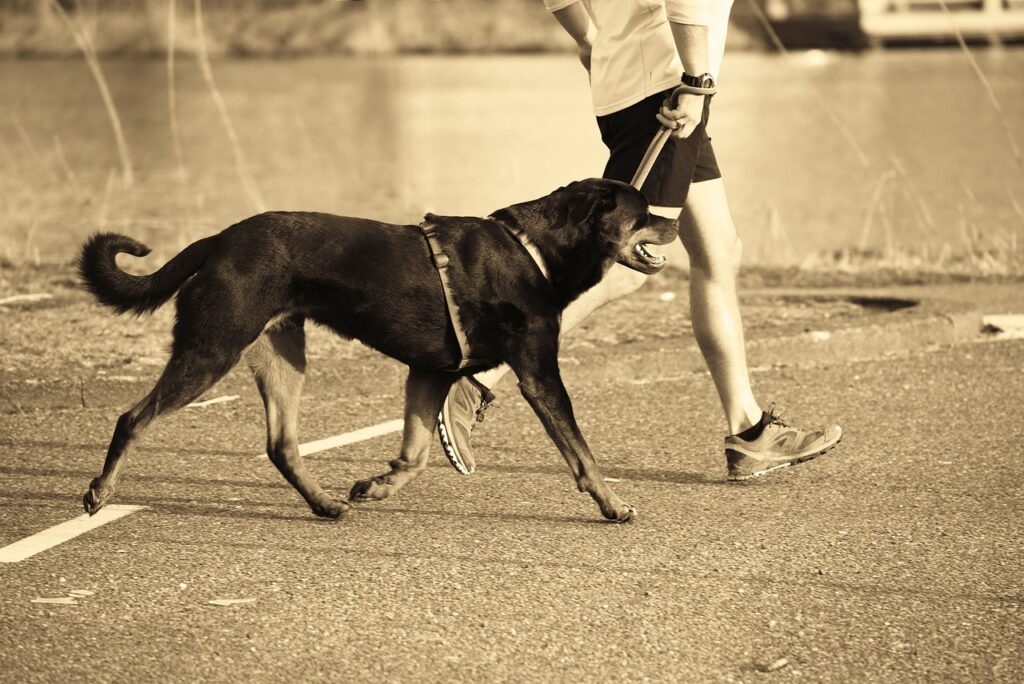
You may not think about it often, but just like humans, dogs need to have healthy lungs in order to live a happy and active life. But how exactly can you ensure that your furry friend’s lungs are in tip-top shape? From providing regular exercise to avoiding exposure to pollutants, there are a variety of simple steps you can take to keep your dog’s lungs healthy and ensure they have many years of playtime ahead of them.

Regular Exercise
Regular exercise is crucial for maintaining your dog’s lung health. There are various types of exercises that you can engage your furry friend in. Activities such as walking, running, playing fetch, or even swimming can help keep your dog’s lungs strong and healthy. These exercises not only increase lung capacity but also help in improving blood circulation, which is essential for delivering oxygen to the lungs. By incorporating regular exercise into your dog’s routine, you can ensure that their respiratory system remains in optimal condition.
Types of Exercise
When it comes to exercising your dog, there are numerous options to choose from. Walking is a popular and accessible exercise that suits most breeds. It allows for moderate cardiovascular activity that promotes healthy lung function. If your dog has more energy to burn, running or jogging can provide a higher level of intensity and help build endurance. Other activities like playing fetch or participating in agility training can also engage your dog’s respiratory system while providing mental stimulation.
Frequency of Exercise
The frequency of exercise largely depends on your dog’s age, breed, and overall health. Puppies and younger dogs generally require more exercise to burn off their energy. As a general rule of thumb, adult dogs should engage in at least 30 minutes to 2 hours of exercise per day, depending on their breed and energy level. Some high-energy breeds may require even more exercise. However, it’s crucial to consult with your veterinarian to determine the appropriate exercise routine for your dog.
Exercise Considerations for Different Breeds
Different dog breeds have varying exercise needs and limitations. Brachycephalic breeds, such as Bulldogs or Pugs, have shorter muzzles, which can make breathing more challenging during physical activity. These breeds may need shorter and less intense exercise sessions to prevent respiratory distress. On the other hand, highly active breeds like Border Collies or Huskies may require more frequent and intense exercise to keep their lungs healthy. It’s important to research and understand your dog’s breed to tailor their exercise routine to their specific needs.
Maintaining a Clean Environment
A clean environment plays a vital role in promoting good respiratory health for your furry friend. Indoor air quality is especially important as dogs spend a significant amount of time indoors. By taking a few precautionary measures, you can help reduce the likelihood of your dog inhaling harmful pollutants.
Clean Indoor Air
Regularly cleaning and dusting your home can prevent the accumulation of dust, dander, and other allergens that can irritate your dog’s respiratory system. Vacuuming carpets and upholstery and maintaining a clean living space will help ensure that your dog breathes in clean air at home, reducing the risk of respiratory issues.
Avoiding Tobacco Smoke
Just like humans, dogs can be negatively affected by secondhand smoke. Exposure to tobacco smoke can lead to chronic respiratory problems, including bronchitis and asthma. It’s important to avoid smoking around your dog or exposing them to environments where there is tobacco smoke.
Reducing Exposure to Pollutants
Reducing your dog’s exposure to environmental pollutants is crucial for maintaining their lung health. Keep your dog away from areas with heavy traffic or industrial pollution, as these can have a detrimental impact on their respiratory system. Additionally, consider using air purifiers or indoor plants that naturally filter the air to further enhance the air quality within your home.
Proper Nutrition
Proper nutrition is essential for overall health, including respiratory well-being. Providing your dog with a balanced diet that meets their nutritional needs can significantly contribute to maintaining healthy lungs.
Balanced Diet
Ensure that your dog’s diet consists of high-quality proteins, carbohydrates, healthy fats, and a variety of fruits and vegetables. A balanced diet rich in nutrients provides the necessary vitamins and minerals that support respiratory health.
Avoiding Harmful Foods
Certain foods can trigger respiratory issues in dogs, especially those with existing allergies or sensitivities. Avoid feeding your dog foods that are known to cause allergies, such as wheat, corn, soy, or artificial additives. Additionally, be cautious with table scraps, as certain ingredients like onions, garlic, or chocolate can be toxic to dogs and may affect their respiratory system.
Supplements for Respiratory Health
In consultation with your veterinarian, you may consider adding supplements that support respiratory health to your dog’s diet. Natural remedies like omega-3 fatty acids or herbal supplements can help reduce inflammation in the airways and promote better lung function. Always consult with your veterinarian before introducing any new supplements to your dog’s diet.
Avoiding Respiratory Irritants
Reducing your dog’s exposure to respiratory irritants is crucial in maintaining their lung health. There are several common irritants that you should be aware of and take precautions to limit their exposure.
Secondhand Smoke
As mentioned earlier, secondhand smoke can be detrimental to your dog’s respiratory health. Ensure that your dog is not exposed to environments where there is active smoking, as it can increase the risk of respiratory issues and even lung cancer.
Chemical Fumes
Strong chemical fumes from cleaning products, paint, or other household chemicals can irritate your dog’s respiratory system. When using such products, keep your dog in a well-ventilated area or temporarily relocate them to another room to minimize their exposure.
Airborne Allergens
Dogs, like humans, can be allergic to various substances such as pollen, dust mites, or mold spores. Limiting your dog’s exposure to these allergens can help prevent respiratory allergies and related issues. Regularly cleaning your home and bedding, using allergy covers on their bedding, and keeping windows closed during high pollen seasons can all help reduce their exposure to airborne allergens.

Regular Veterinary Check-ups
Regular veterinary check-ups are crucial for monitoring your dog’s respiratory health and catching potential issues early on.
Monitoring Lung Health
During routine check-ups, your veterinarian will listen to your dog’s lungs using a stethoscope to assess their respiratory sounds and detect any abnormalities. Regular lung examinations can help identify early signs of respiratory conditions and allow for prompt treatment.
Identifying Respiratory Issues Early
Respiratory issues in dogs can range from minor irritations to more severe conditions. Regular veterinary check-ups can help identify early signs of respiratory distress, such as excessive coughing, wheezing, or shortness of breath, which may require further investigation and treatment.
Vaccinations and Preventive Medications
Following your veterinarian’s recommended vaccination schedule is vital for preventing respiratory diseases in dogs. Vaccinations against diseases such as kennel cough, canine influenza, or respiratory infections can help protect your dog’s respiratory system from potential threats. Additionally, your veterinarian may recommend preventive medications, such as heartworm prevention, to maintain overall respiratory health.
Reducing Stress
Stress can have a significant impact on your dog’s overall health, including their respiratory system. It’s important to create a calm and stress-free environment to support their respiratory well-being.
Impact of Stress on Respiratory Health
Stress can weaken the immune system and make your dog more susceptible to respiratory infections. Chronic stress can also lead to conditions like anxiety-related panting, which can put additional strain on their respiratory system.
Creating a Calm Environment
Providing a safe and comfortable environment for your dog is essential for reducing stress levels. This includes creating a dedicated space for them to relax, ensuring regular exercise and mental stimulation, and establishing a consistent daily routine.
Managing Separation Anxiety
Separation anxiety can be a significant source of stress for some dogs, potentially affecting their respiratory health. If your dog experiences separation anxiety, consider the use of desensitization techniques, crate training, or seeking guidance from a professional dog trainer or behaviorist to help manage their anxiety and reduce its impact on their respiratory system.

Maintaining a Healthy Weight
Maintaining a healthy weight is crucial for the overall well-being of your dog, including their respiratory health. Obesity can have a detrimental effect on the lungs and make it more challenging for your dog to breathe properly.
Weight Management Guidelines
Obesity can put extra strain on the respiratory system and lead to conditions such as decreased lung capacity or respiratory distress. Following weight management guidelines recommended by your veterinarian, such as portion control and regular exercise, can help keep your dog at a healthy weight and support their respiratory health.
Effects of Obesity on Lungs
Excess body weight can compress the lungs and make it more difficult for your dog to breathe deeply. This can result in reduced oxygen intake and compromised lung function. By maintaining a healthy weight, you can help ensure that your dog’s lungs have enough space to expand and contract properly.
Exercise and Diet Plans
Working with your veterinarian, you can develop a tailored exercise and diet plan for your dog. Regular exercise, combined with a balanced diet that suits your dog’s specific nutritional needs, will help maintain a healthy weight and support their respiratory health.
Avoiding Exposure to Environmental Toxins
Environmental toxins can pose a significant risk to your dog’s respiratory health. It’s important to be aware of common toxins in and around your home and take precautions to minimize your dog’s exposure.
Household Chemicals
Many household cleaners, pesticides, and certain plants can release harmful chemicals into the air, which your dog may inhale. Store household chemicals out of your dog’s reach, use pet-friendly cleaning products, and ensure proper ventilation when using potentially harmful substances.
Pesticides and Herbicides
If you use pesticides or herbicides in your yard or garden, be cautious about their potential respiratory effects on your dog. Whenever possible, opt for natural alternatives or ensure that your dog is kept away from treated areas until it is safe for them to return.
Toxic Plants
Some indoor and outdoor plants, such as lilies, azaleas, or sago palms, can be toxic to dogs and may cause respiratory distress if ingested. Familiarize yourself with common toxic plants and ensure they are out of your dog’s reach.
Monitoring Indoor Air Quality
Monitoring and improving indoor air quality is essential for maintaining your dog’s respiratory health, especially if they spend a significant amount of time indoors.
Using Air Purifiers
Investing in an air purifier can help remove airborne particles, allergens, and pollutants from your home’s air. Look for a high-quality air purifier with a HEPA filter that can capture even the smallest particles, promoting cleaner and healthier indoor air.
Ventilation and Air Circulation
Proper ventilation and air circulation are crucial for maintaining good indoor air quality. Ensure that your home is well-ventilated by opening windows when weather permits or using fans to promote air movement. This helps prevent the buildup of pollutants and promotes fresh airflow.
Minimizing Moisture and Mold
Excessive moisture and the presence of mold can negatively affect your dog’s respiratory health. Control moisture levels in your home by using dehumidifiers or ensuring proper ventilation in areas prone to dampness, such as bathrooms or basements. Regularly inspect and address any signs of mold growth to protect your dog from potential respiratory issues.
Recognizing and Addressing Respiratory Symptoms
Being vigilant and aware of respiratory symptoms in your dog is crucial for prompt treatment and management of respiratory conditions.
Coughing and Wheezing
Persistent coughing or wheezing can be a sign of respiratory distress or underlying lung conditions. If your dog experiences prolonged coughing or wheezing, it’s important to consult with your veterinarian to determine the cause and appropriate treatment.
Shortness of Breath
Unexplained shortness of breath, rapid breathing, or labored breathing in your dog should not be ignored. These symptoms can indicate a range of respiratory issues, from allergies to more serious conditions, and require veterinary attention.
Nasal Discharge
Unusual nasal discharge, especially if it contains blood or has a foul odor, should be evaluated by your veterinarian. Nasal discharge can be a sign of respiratory infections or other underlying respiratory issues that need to be addressed promptly.
In conclusion, maintaining your dog’s lung health requires a combination of regular exercise, a clean environment, proper nutrition, avoidance of respiratory irritants, regular veterinary care, stress management, weight maintenance, exposure to environmental toxins, monitoring indoor air quality, and recognizing respiratory symptoms. By implementing these practices and consulting with your veterinarian, you can help ensure that your furry friend breathes easy and enjoys optimal respiratory health. Keep in mind that each dog is unique, and it’s important to tailor their care to their specific needs to promote lifelong lung health.

